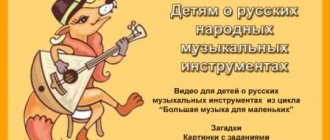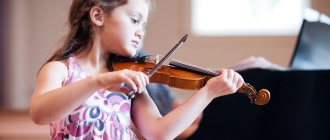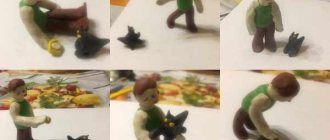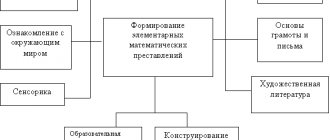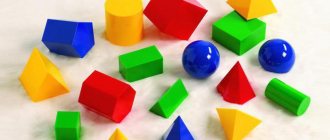The purpose of music lessons in kindergarten, specific tasks and techniques
The music director’s main goal is to bring pleasure and joy to his students through his work. However, with each lesson he develops many skills and develops cultural perception.
Tasks and techniques for teaching children music (first junior group)
Training tasks. Children must learn:
- move rhythmically to the music;
- distinguish the mood and character of a musical composition;
- extract the desired sound from musical instruments and play in an orchestra;
- distinguish musical shades and sound dynamics;
- collective dances.
Dancing in pairs for two-year-olds is not easy, but fun.
In music classes it is necessary to develop:
- responsiveness while listening to musical compositions;
- subconscious sense of tact and ability to play instruments rhythmically;
- musical thinking;
- cultural consciousness.
- using audio recordings to expand children's understanding of types of music;
- using illustrations to clearly explain what is being said, or to enable the child to do so.
Tasks and techniques for teaching children music (second junior group)
- teach children to play musical instruments: spoons, drums;
- learn to pronounce all sounds correctly;
- teach students to intonate, sing drawn out;
- teach to distinguish the nature of a musical composition, genre;
- teach round dance step.
- develop the child’s desire to independently engage in choreography and music;
- develop cultural awareness;
- to form the idea that music is involved in different areas of life.
- individual approach, “singing along the chain”;
- games with musical content.
Music classes for younger kindergarten groups
Anna Pyshnenko 08/23/2017 1 11.3k
Working with young children is difficult - it is a responsible process that requires great knowledge and skills. Creating a clear lesson plan, choosing an original approach, and borrowing creative ideas will help novice teachers get used to it faster, and experienced teachers diversify their classes. The music director faces many tasks that must be clearly understood and carried out. You will learn about the tasks and ways to implement them from this article.
Summary of an integrated lesson in the 2nd junior group on the topic Autumn
Integrated lesson in the second junior group on the topic “Autumn”
Objectives: to expand children’s ideas about the surrounding nature, about the upcoming autumn holiday; develop artistic and visual perception, thinking and coherent speech. Reinforce knowledge about color. Develop the ability to work in a team, cultivate a desire to create materials and decorations for the holiday. Materials and equipment: easel, bright autumn leaves of different shapes and colors, a sheet of Whatman paper, glue, napkin, a painting of an autumn forest. Musical accompaniment: musical composition “Autumn” (translation by N. Trakov) lyrics. M. Bikbova, music. A. Khasanshina. 1. Organizational moment: Educator. Leaves are falling, falling leaves are falling in our garden. Yellow and red leaves curl and fly in the wind. What time of year is the poem talking about? (about autumn) How did you guess? (children's answers). Guys, today I invite you to the autumn forest (leads the children to a painting depicting an autumn forest). 2. Main part: Educator. Summer has passed, autumn has come. It’s cold in the forest in autumn, the leaves on the trees are no longer green, but what are they? (yellow, red) The sky is darker in autumn, there are clouds on it, it will probably rain soon. The wind blows and leaves fly off the branches. Do you see how many there are under the trees? 3. Musical and rhythmic movements: The teacher hands out colored autumn leaves and invites the children to turn into them. Children listen to a story about leaves and perform movements to the music “Autumn”, in accordance with the text of the poem. Now autumn has come to the garden (Children move in a circle, in simple steps)
Yellow leaves are circling
(Having the leaves out in front of them, they wave them right and left, raising their hands above their heads)
Yellow, red, The most beautiful.
(They spin around in a simple step, holding their hands with leaves above their heads)
Wind, stop, don’t whistle There’s no need to rake the leaves!
(they wave the leaves right and left)
We won’t give you the leaves
- (they hide the leaves behind their backs)
We want to play ourselves!
(Hold the leaves in front of you)
4. Creating an autumn picture: Educator: the autumn holiday is coming. What will we do at the holiday? (we will sing songs about autumn, recite poems, dance). How will we decorate the hall? I suggest you make an autumn picture from these leaves. Children, with the help of a teacher, smear the leaves with glue, go to the easel with whatman paper and glue them. While performing these actions, the teacher asks each child “what color is your leaf, is it big or small?” 5. Reflection: The children, together with the teacher, admire the created picture and take it to the music room.
We recommend watching:
Autumn entertainment in the younger group “Visiting Autumn.” Scenario Autumn holiday in the younger group. Scenario Notes for a lesson in the younger group. Gifts of Autumn Scenario for an autumn holiday for kindergarten. Junior – middle group
Similar articles:
Scenario for the autumn holiday in the younger group
Indoor games in kindergarten in the fall. Junior group
Teacher portal
Author:
Parseghyan Valentina Ivanovna
Position:
music director
Educational institution:
MDOU "Kindergarten "Forest Fairy Tale""
Locality:
Longyugan village, Yamal-Nenets
Name of material:
Methodological development
Topic:
Summary of a music lesson in the second junior group "Autumn Glade"
Date of publication:
10/09/2017
Section:
preschool education
Summary of the music lesson “Autumn Meadow”
(2nd junior group)
— Increase children’s interest in musical activities.
— Develop memory, attention, melodic, dynamic, rhythmic
hearing, creativity of children.
Spoons, bells, sticks - according to the number of children; triangle, ratchet,
metallophone - for the teacher.
Bear, den, bed, autumn leaves.
Music center, CDs, laptop, synthesizer.
1. “Leaves” by A. Filippenko (exercise - dance).
2. “Autumn” by Yu. Mikhailenko (triangle, rattle, rattle – plays
3. “Raindrops” (metallophone - music director plays).
4. “Rain” by V. Kostenko (triangle - child playing).
5. “Naughty Rain” by R. Neronova (sticks - all children play).
6. “Like ours at the gates” (recording, orchestral performance (improvisations on
7. “Kalinka”, Russian folk melody (spoons - all the children play,
8. “Dance with bells”, Ukrainian folk melody (bells –
9. “Quiet and loud bells” by E. Tilicheeva (musical didactic
10. “Lullaby of the Bear” by E. Krylatov (listening to an audio recording).
Music director:
Guys! Look how kind and gentle the sun is shining for us
out the window, smiling. Let us smile at him too. What do we have in
does the room smell like that? It smells like autumn! Probably autumn is somewhere nearby
clearing. Yes, here she is, look.
Autumn leaves are scattered on the carpet, in the center sits a large
Music director:
Hello, Mishenka the Bear!
Bear.
Hello, kids, girls and boys!
Music director:
What are you doing here?
Bear.
I collect beautiful autumn leaves.
Music director:
Do you want us to teach you to dance with them?
Bear.
I love to dance.
The dance exercise “Leaves” is performed, music by A. Filippenko (with
Music director:
Bear, do you know who made the leaves beautiful? Right,
Autumn. Do you want to listen to a song about Autumn?
The song “Autumn” is staged, words and music by Yu. Mikhailenko (on
The teacher plays repeated lines in verse 1 - on a triangle,
in the 2nd verse - on a rattle, in verse 3 - on a rattle).
Music director:
("Raindrops" plays on the metallophone).
Here come the drops
They knocked on the path,
Perhaps the rain needs to sing a magic song. On a triangle
Who wants to play?
The song “Rain” by V. Kostenko is performed (a willing child on “drip-drip-
cap" strikes the triangle rhythmically).
The musical director again plays “Droplets” on the metallophone
Music director:
For some reason it doesn’t stop raining, it’s probably being naughty.
Misha, our guys know the song about naughty
rain and know how to play it on sticks.
“Naughty Rain” by R. Neronova is performed (choral singing
accompanied by all the children playing on sticks, the Bear also plays).
Bear.
How fun you are, good! I even wanted to dance.
Music director:
Well, Mishenka, dance, and we’ll play spoons for you.
The recording sounds “Like ours at the gates” (orchestral performance,
children improvise on spoons, the Bear dances).
Music director:
Misha, would you like the guys to teach you how to play and dance?
The dance “Kalinka” is performed, a Russian folk melody (for 1 hour of music
children play on spoons, rhythmically walk in a circle, for 2 hours. Music
the teacher plays the bell).
Music director:
Misha the bear also wants to ring? And do you want? Then all
“Dance with Bells,” a Ukrainian folk melody, is performed.
Music director:
Misha, the bells can play quietly and loudly.
A musical and didactic game “Silent and Loud Bells” is being held
Bear:
I liked it so much!
Music director:
Stay, Mishenka, we have a den, you’ll sleep in it
all winter, and in the spring we will wake you up with a cheerful song.
To the “Lullaby of the Bear” by E. Krylatov, the children put the Bear in
